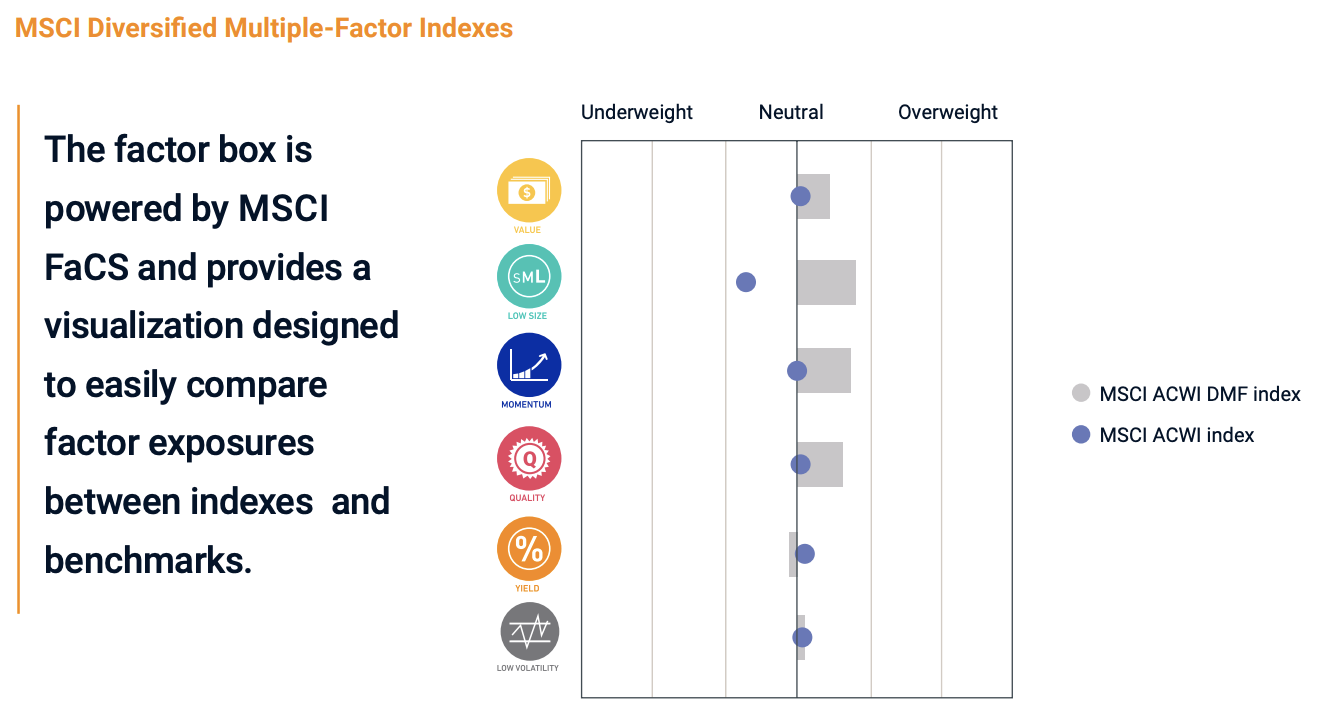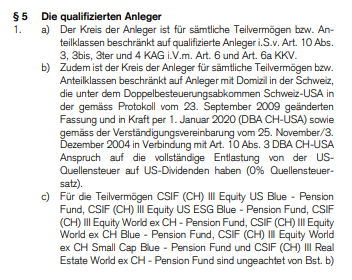Does it mean that you buy those two?
No hedging.
And I definitely want the UK included:
On which market do you buy these two EFTs from UBS and Amundi? I guess on Xetra because it has higher trade volume?
Thanks for the information. If you remember the source, I would be very interested in it.
On https://amfunds.credit-suisse.com/ch/fr/institutional/fund/detail/CH0253609066 under publications → prospetus in German.
Page 3, section 5.1 c). This fund is not specified
Can you elaborate on that? They created these indexes years ago. The ETFs based on them exist since 5+ years.
Anyway, if you guys are believers in factor investing, then would it not make sense to invest in the multifactor ETF? It includes Quality, but outperforms it at times when other factors shine through. iShares offers the ACWF and IFSW. They have both pretty low AUM and high TER, though.
This graphic illustrates what the index aims for:

I really recommend reading this brochure from MSCI.
Here’s what they write about quality:

Monthly investment plan, so I don‘t even know. Might be on the smaller German exchanges. But it would be a small one-time difference anyway. For a one-time investment, I might just choose Xetra.
From the wording, it doesn’t need to be?!
Section c) only extends the set of qualified investors specified (beyond those) in b)
(I haven’t read the whole though, especially didn’t check the references to units in d) and e))
It’s not super clear. But the index is MSCI “World ex Switzerland (NR)”, NR = 30% on US dividends. The fund overperforms the index by 30 basis points a year. This means the fund is able to reduce the to around 15% on dividends. If it uses the double tax agreement, the tax on dividend would be 0%.
I’m not 100% sure, but quite confident about this affirmation.
You can check this post for more details: New 3a solution from Finpension
I had a quick read through a few of Bogleheads forum threads on factor investing. There are a few mentions of the ACWF, momentum & quality. But there are also many market cap weighting purists. One of them posted this:
Eugene Fama: “Whether you decide to tilt toward value depends on whether you are willing to bear the associated risk…The market portfolio is always efficient…For most people, the market portfolio is the most sensible decision.”
Harry Markowitz: “A foolish attempt to beat the market and get rich quickly will make one’s broker rich and oneself much less so.”
Paul Samuelson: “The most efficient way to diversify a stock portfolio is with a low-fee index fund. Statistically, a broadly based stock index fund will outperform most actively managed equity portfolios.”
William Sharpe: “You may think your opinion is superior, but it pays to be humble, investing in the market rather than trying to beat it.”
Robert Shiller: “A portfolio approximating the market may be the most important portfolio.”
I wonder how much can we look at historical charts to tell us the future. For sure future will not be 100% like the past, but also not 0%.
If anything, d) and e) might be the relevant sections, as they provide additional requirements in addition to a) and b).
But to look at it differently, doesn‘t the prospectus read as if the pension fund units do benefit from preferential tax treatment anyway? As I understand it, they‘re just restricting the qualified investors eligible for investment to pass down these dividends to?
Well, that contradict investing investing in MSCI Quality ETFs, does it?
They are still low-fee index funds and and broad-based, and not get-rich-quick schemes, aren’t they?
Investing more than half of your capital in one (330mio. population) country and its listed companies alone isn‘t really more „broadly diversified“ (though maybe in line with the overall market).
Nice to see you post again, I find this post very valuable. So, basically, you’re saying: don’t get fooled by historical charts, because the indexes have been tampered with in order to give this positive historical outperformance? Also, the record-low interest rates might be at play, if I understand you right. So, if we see the rates go up, we might see a total shift in which factor might outperform and which underperform.
I was under the impression that thanks to factor investing (like the quality factor) we can weed out some less promising stock (which somehow still holds a high price?). Intuitively, it does not make much sense, but the historical charts tell a different story.
I welcome your criticism. However there are certain of your arguments i do not get.
For instance:
Would you mind sharing the details of your calculation? Either i am missing some assumptions or the results are very wrong. For instance, given the 8% discount rate you are using, the second company should trade at P/B=1 and forward P/E = 1/8% = 12.5. Company 1 should trade at even lower multiples.
I have two questions:
- Can you share the source of the quoted passage? It seems the author has a strong opinion on the topic and I would like to understand his arguments.
- So if I understand correctly, the argument is that when interest rates will rise, good companies will suffer? I get that, but why would they suffer more than crappy businesses? A rise in interest rates will impact all assets (stocks, bonds, real estate, …). An in particular for stocks:
- The discounting rate might increase, but it is the same for every business and is equal to the opportunity cost of your second best alternative. Unless you think we should use WACC, which stands on the very shaky foundations of CAPM. On this basis all businesses are on the same shelf.
- It might very well be that an increase in interest rates reduces the weight of future earnings and thus triggers a re-rating of the multiple. But i treated this exact point in my very first post. Even with a bad timing and a contraction of the multiple of the stock, over the long term it does not really matter. In the long term you will converge to the average return on capital of the stock (see the Munger point above). As long as you did not pay a ridiculously high multiple for the stock you should be fine.
- On the financing side, good businesses use way less debt than other businesses, so their cost of financing will be less impacted than crappy businesses for which interest payments will either rise a lot or stop being refinanced. Here i do not see why good businesses should perform worse than crappy businesses.
Finally, I see that this thread slowly drifted to factor investing in general, which was not the original point of the topic. My point was that over the long term your returns converge towards the average return on capital of your business. Especially, I do not endorse anything related to the “value vs growth” so-called factors.
Kind regards,
Julianek, who drinks way too much sencha tea as well.
Well, Quality (or Profitability as its subset I guess) is one of the known factors, and MSCI Quality Index certainly tilts towards it, no?
So it is a factor play in my eyes (vs. e.g. Value etc.).
I admit I might be wrong, my knowledge here is limited. 
In that particular case, Apple has developed an entrenched ecosystem of services with customer lock-in, network effects - and a strong rooting in the less volatile non-consumer market.
Nokia had… solidly built phones. And snake.
What’s true for Apple, is probably even more true for Microsoft: Even releasing very poorly received versions of their flagship platform software, such as Windows 8, (the other important platforms being Office, and maybe Exchange) couldn’t really hurt their stranglehold over the market.
5 years is quite short as a timeframe. How can we be sure that the smart indices are not optimized to outperform the vanilla funds in backtests? I have seen multiple smart factor indices changed or disappeared because of underperformance.
Let’s take your exemple “Multiple-Factor Index” launched in 2015
https://www.msci.com/documents/10199/0f369f17-3a93-41d3-9b8d-fc3594176fcb
Since it’s creation (5 years return) the fund has underperformed, maybe it’s bad luck (obviously factors can’t always outperform) or maybe the model has been optimized for the backtesting (since 1998 the fund has outperformed)
@San_Francisco,
Quite interested in this ETF, as my Europe (apart from CH home bias) exposure is low atm. TER is 0.23% lowish, but it’s a synthetic ETF, which I’ve avoided until now.
How do judge this risk, low enough to ignore? Yes, I suppose.
Apparently risk is max. 10% acc to EU rules.
And did you buy it on Paris Euronext, paying that small French Stamp Duty?
The prospectus says only available for Qualified Investors in CH, so probably not bought through a Swiss broker, right?
Monthly investment plan via a German broker. Small fee, probably some spread. They route their orders through a German stock exchange. Not worried about further optimising down to a fraction of percent. Neither am I worried about the risks synthetic ETFs.
Practically I haven’t heard much about a counterparty defaulting. And I doubt ETF providers are maxing out the 10% threshold.
Thing is, a bad stock can only lose 100% of its value, while there’s no limit to how much a great stock can grow. This emphasis on the mediocre companies is misplaced IMVHO and I’d rather choose to make sure not to miss any of the superb stocks than to shave off some losers.
That said, thanks for the post, I have enjoyed it (did not read the rest f the thread though, I admit).
I think this (making sure not to miss any superb stocks) is probably the most difficult - and thus worst approach to investing if you’re aiming for above-market returns. Which the idea of factor investing is, isn‘t it?
It‘s like harvesting fruits (selecting by touch and outward appearance):
- Identifying a few „good“ apples (that you know they’re good before eating or slicing them) is relatively easy, if you basic idea of what makes a good edible fruit.
- So is identifying a few bad apples.
- Inevitably you’re going to err on some of them, if you take a lot of apples.
- But wanting not to miss out on any good ones, while aiming for a higher than average share of good apples is insanely difficult. As good as impossible.

